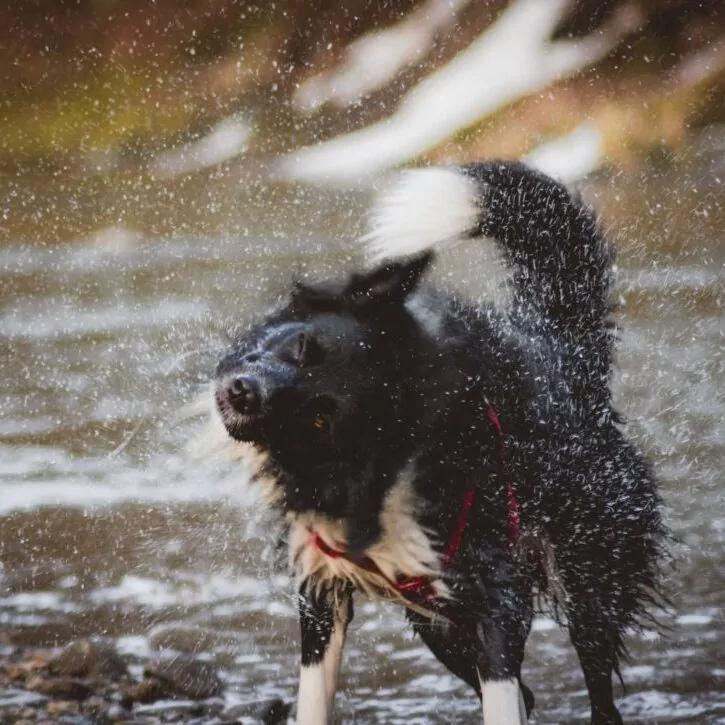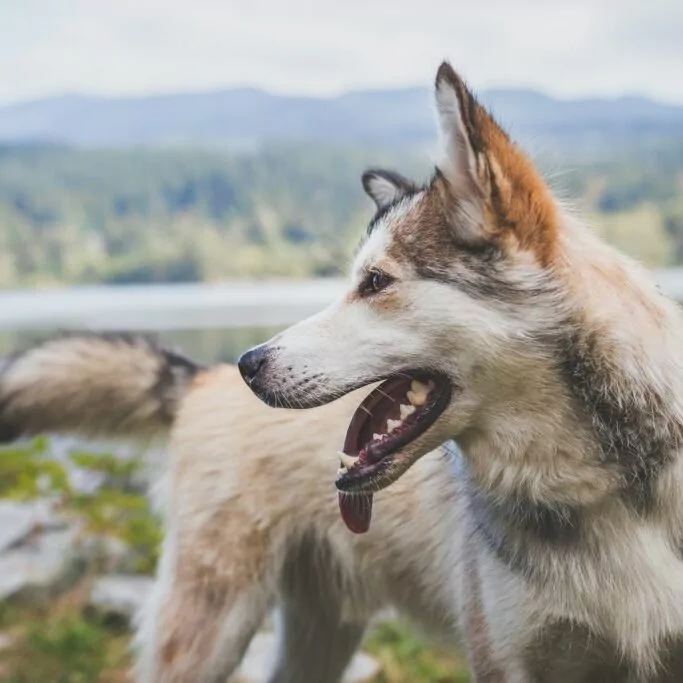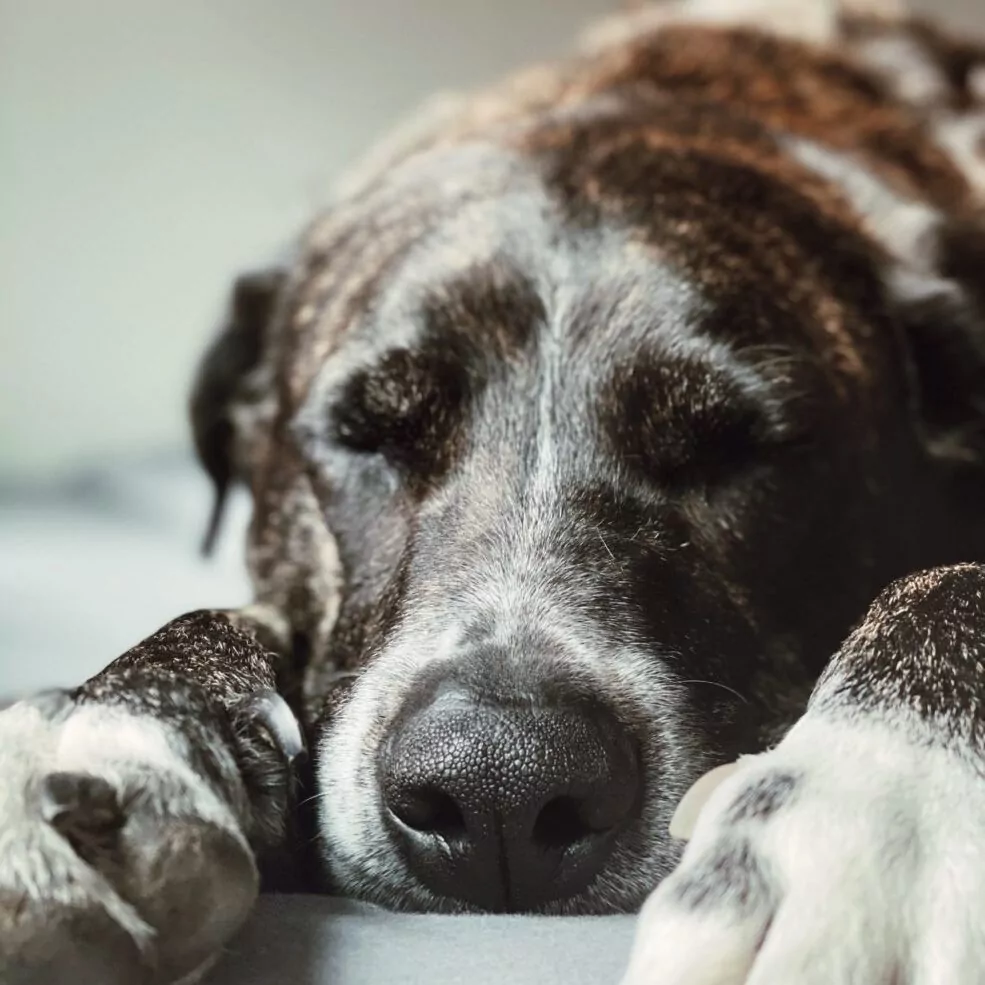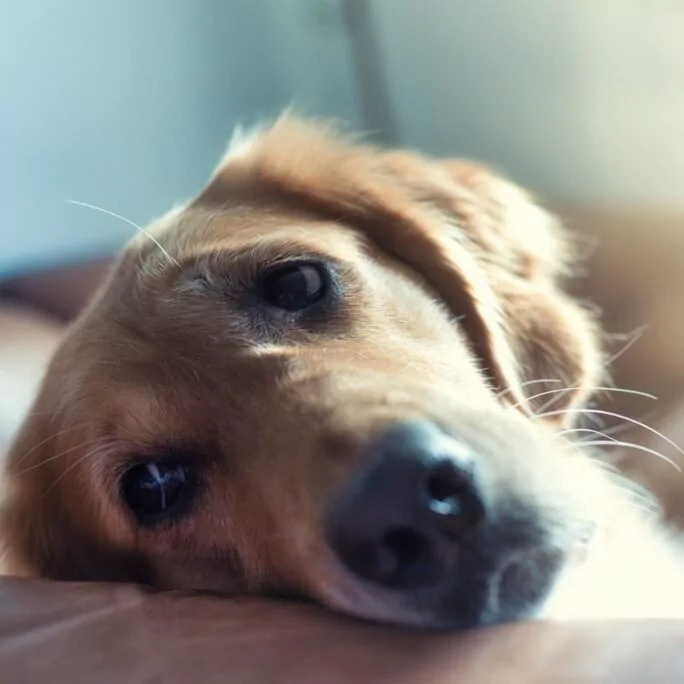Behavior & Symptoms
Why Is My Dog Urinating in the House?

Pee happens. You may be surprised, baffled or even a bit frustrated upon discovering a piddle on your new living room rug or a wet yellow spot on your bedroom sheets. However, from your doggo’s point of view, these are not liquid “accidents.” These acts are committed for valid – and sometimes – uncontrollable reasons.
Our dogs can’t tell us the cause and that’s where the challenge arises. The fact is, any dog at any age can urinate indoors at any time. The reasons are many but basically can be lumped into four categories: Medical, behavioral, situational, and age.
To try to determine the cause, pay attention to your dog’s potty habits to establish a healthy baseline. Take note of the following:
- How many times a day your dog needs to urinate
- How many seconds he takes to urinate and if he seems to take more or less time to pee per time
- How he best “tells” you when he needs to head outdoors for a potty break or if he stops alerting you
- If your dog starts to drink more water than normal
- If your dog starts to urine-mark on furniture or tall surfaces in your house
- If your dog loses bladder control when he gets excited or frightened
If you have more than one dog, recognize that each one has his own unique potty habits. Report any changes to your veterinarian.
“It is always good to watch not just your pet’s urinary behavior, but also water-drinking activity,” says VetScoop contributor Julio Lopez, DVM, DACVIM, a board-certified internal medicine specialist who practices in Los Angeles.
It is important to rule out any possible medical problems first and always book at least an annual – ideally, a semi-annual – thorough veterinary examination on your dog so that problems may be caught early and treated more quickly, often at less expense.
“The answers owners provide to health history questions combined with a physical exam and a wellness blood and urine screen, especially in older pets, can help detect issues early,” he says. “A urinalysis can be an early marker of disease before changes occur on a blood test, especially when determining kidney function. This is why a urine test should always be performed in conjunction with any screening blood test.”
Medical Causes of Inappropriate Elimination
While it is expected that your newly adopted pupper needs steady and positive schooling – think housetraining 101 – don’t dismiss the piddles in your home as simply due to your pup’s learning curve.
“Some pups take longer to potty train or seem to regress, so it is always a good idea to discuss any concerns with your veterinarian to make sure it is attributed to normal puppy behavior and not an underlying medical condition,” says Lopez. “Some puppies, for example, can get urinary tract infections. Others can be born with abnormalities of their urinary tract.”
Do’s and Don’ts of Housetraining a Puppy
The art of properly training a young pupper to learn that his bathroom is always outdoors can be challenging.
VetScoop contributor Lisa Radosta, DVM, DACVB, a board-certified veterinary behaviorist who owns Florida Veterinary Behavior Service in West Palm Beach, shares these tips to set you and your dog up for success:
- Do take your puppy out on a schedule every couple of hours.
- Do manage your expectations. “Puppies have short attention spans and can hold their urine and feces for limited amounts of times,” she says.
- Do reinforce your pup with food, praise or play when they eliminate in the right spot.
- Don’t yell, hit or rub your pup’s nose in urine in the house. “You are going to scare the puppy and do you really want the puppy to be scared of you?” she points out.
- Don’t let your puppy wander around our house unsupervised until he is able to 100-percent of the time hold his urine for up to four hours at a time consistently for one week.
- Don’t give your puppy a doggy door. Beyond the fact that your puppy is not safe outside by himself, you are not really teaching him proper potty habits. “Your pup may learn that the outdoors is better, but if you aren’t there to reinforce him with food or play when he urinates outside, he may never learn that outdoors is desirable to you for him to urinate,” Radosta says.
Senior Dog Issues
If your dog starts to urinate in the house after years of always peeing outside rain or shine, night or day, that’s a red flag. Take note of any changes in your dog’s urination habits and level of thirst and factor in frequency and quantity. Dogs who start to gulp down more water will need to pee more often and they may not have good bladder control.
“Many diseases, such as urinary tract infections, diabetes, kidney disease, and Cushing’s disease can cause changes in urinary patterns,” Lopez says.
Dogs who show signs of discomfort or pain while urinating may have a bladder infection or, worse, bladder stones. If they squat and release a few drops inside and outside, that could signal kidney stones or a blockage in the urinary tract. If you detect pungent urine odor, your dog could have a bladder or kidney infection.
Some spayed female dogs can experience leaking urine while resting or sleeping due to weakened urethral muscles.
“There are a few medications that may help by either stimulating the muscle or providing estrogen to strengthen the muscle,” says Lopez. “These medications work well in most cases.”
On the other end of the age spectrum, golden oldie dogs may be dealing with health issues, including weak or leaky bladders or foggy memories that can result in urine incidents in the house. Sometimes, a geriatric dog will urinate when napping, which could signal incontinence or even early start of cognitive dysfunction or brain disease.
“Yes, some aged dogs can ‘forget’ where they are when they urinate,” Radosta says. “They go outside and almost forget what to do. Then, they come inside and immediately eliminate. Keep in mind that all dogs often have physical ailments which affect their ability to maintain their house training.”
Sudden piddling in the house by senior dogs may be due to fading sight and hearing as well as a weakened immune system.
Medication prescribed will depend on why the dog is urinating. Sometimes, that answer is clear; other times, not.
“Unfortunately, when it comes to cognitive decline in dogs due to aging, there is not one magic pill that will help them return to normal,” says Lopez. “Your veterinarian will determine if there are other underlying medical conditions involved and whether supplements, such as fish oils, may be beneficial to your dog’s brain health.”
Behavioral Causes of House Soiling
Sometimes, your dog may be wrestling with mind over bladder. A dog can experience the emotional spectrum from excitement to stress to fear. Each of these emotions can trigger piddling in the house.
Your overly exuberant doggo may lose bladder control at the sight of a favorite person or doggy playmate entering your house. Or, if your dog is anxious or stressed about meeting someone, he may urinate during greeting to communicate he does not pose a threat to that person.
“If a dog is excited, the body language will be soft, like a noodle,” says Radosta. “If the dog is in conflict, the body language might be consistent with fear, anxiety, stress, and excitement all mixed up together. Unchecked, dogs who grow up to be unsure may continue to pee when greeting into adulthood.”
And then there is the powerful emotion of fear.
“Fear can literally scare the pee (and sometimes, the poop) out of a pup,” Radosta says. “Emotions are intimately paired with physiologic responses. That means what the dog feels can cause a change in the body through hormones, neurotransmitters, and changes to the blood flow among other things. Emotions don’t occur in a vacuum.”
Dogs who have noise phobias may urinate when startled by loud noises, such as thunder, train whistles, or fireworks. Or they may be diagnosed with generalized anxiety because they are too afraid to walk outside, causing them to urinate in the house.
“Medication which affects emotional states is going to be prescribed when there is anxiety or a stress-related component to the urination,” she says. “If a dog has a noise phobia, the veterinarian may simply prescribe alprazolam. If the dog has generalized anxiety, the veterinarian may prescribe an antidepressant.”
Situational Causes of House Urination
Changes in household routines may also cause a dog to suddenly piddle in the house.
“Dogs not only crave routine, they are also completely reliant on us for everything they need to live,” Radosta says. “They don’t even have control in most cases over when and where they eliminate.”
Some dogs, for example, may have an accident in the house while adjusting to time changes due to daylight savings time or because you just completed a house renovation.
It is not unusual for your well-behaved dog to walk into your friend’s house that has dogs and embarrass you by promptly urinating on the floor. Your dog didn’t suddenly forget his potty manners. He or she is, well, engaging in dog talk.
“Your dog may have been stressed by the trip or the visit to a home with dogs,” says Radosta. “We can’t rule out the physical side of the urination mystery. Finally, we always have to consider the effects of smells on a dog’s likelihood of urinating in a certain spot. Dogs are stimulated by smell and if another dog has urinated on that rug or if those smells made your dog feel like she needed to mark that area, those all could be causes.”
“Pee” mail, as it is informally known, emits a lot of info to other dogs who smell the urine. They learn about the dog’s age, sexual status, health condition, and other factors.
“Keep in mind that a dog’s sense of smell is more than 40 times more sensitive than humans,” says Joseph Bartges, DVM, Ph.D., professor of medicine and nutrition at the University of Georgia’s College of Veterinary Medicine in Athens. “There are many pheromones in urine and so peeing to mark is an effective way of communicating for dogs.”
Clean-Up Tips
If your dog does pee in your house, focus on another P: Promptness. Don’t delay in completely cleaning up the wet spot. Here are some effective tips:
- For pee accidents, place layers of paper towels over the wet spot and blot it to soak up the urine.
- Rinse the area with cool water and blot again with paper towels or use a wet vacuum on the area.
- Mix 1 cup of distilled white vinegar, 1 cup of water, and two teaspoons of baking soda into a spray bottle. Shake it up and then spray on the stain. After five to 10 minutes, blot it with more paper towels.
- Or reach for a proven commercial product, such as Nature’s Miracle or Resolve Urine Destroyer Spray, that neutralizes odors and eliminates stains.
Did you find this helpful? Share it!
Questions for your Vet
- Why should I never scold my puppy or even my adult dog after they urinate in the house?
- How long can a puppy and an adult dog stay in a crate before needing to go outside to urinate?
- Why should I have my veterinarian perform urine and blood tests on my dog at least once a year?
About VetScoop
Pets make our lives better. At VetScoop, we’re on a mission to return the favor by giving you access to trustworthy, science-based information so you can provide the best possible care for your pets.
Related Articles We Think You'd Like





